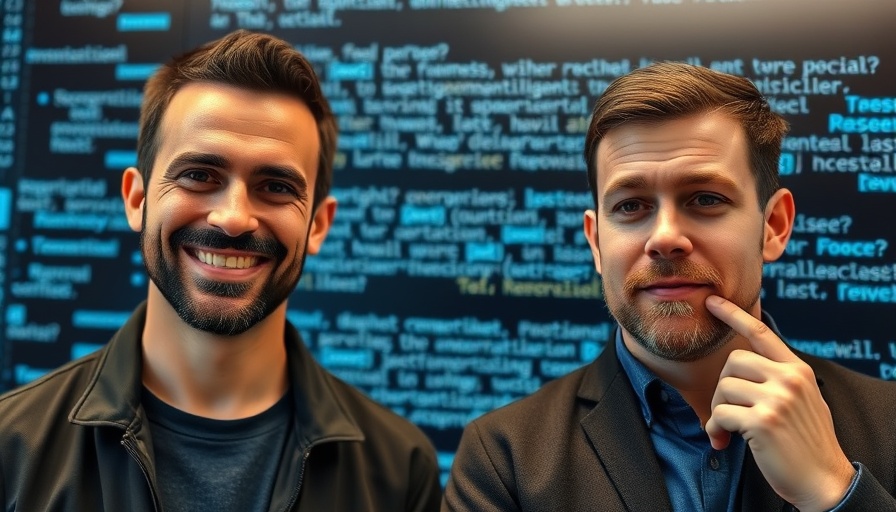
The Power of Collaborative Teamwork
In a world where remote work and online interactions are becoming the norm, transforming individual contributors into a cohesive, motivated team is more important than ever. According to leadership expert Keith Ferrazzi, building effective teams involves more than just traditional leadership—it requires a shift towards a model of collaboration he calls 'teamship.' In his latest conversation with brain coach Jim Quick, Ferrazzi emphasizes the value of fostering emotional connections and mutual support among team members for achieving exceptional outcomes.
In 'Leading With Vulnerability: Radical Honesty, Facing Conflict & Less Authority', the discussion dives into the concept of teamship, exploring key insights that sparked deeper analysis on our end.
What Is Teamship?
Ferrazzi defines teamship not merely as an organizational structure but as a commitment among individuals who support and elevate one another. He argues that by embracing our vulnerabilities and sharing our struggles, teams can cultivate a supportive atmosphere that leads to high performance. "It’s about creating a social contract where we push each other higher, recognizing our collective journey toward a common goal," he explains. Such an environment fosters not only individual accountability but also a strong sense of belonging, which is crucial for motivation and productivity.
The Role of Vulnerability in Leadership
Part of building this collaborative atmosphere involves expressing vulnerability, which Ferrazzi highlights as a strength rather than a weakness. By openly sharing struggles—both personal and professional—team members create an atmosphere of trust. This practice, which he refers to as a 'personal professional check-in,' allows team members to bond over shared experiences and challenges. It ultimately reduces barriers and encourages open communication, which is essential in today’s fast-paced work environment.
Building Psychological Safety within Teams
Fostering psychological safety means creating an environment where individuals feel comfortable expressing themselves without fear of judgment or reprisal. Ferrazzi asserts that this is vital in driving innovation and engagement. Teams that practice real candor can break through the barriers of conflict avoidance, which often hampers progress. He emphasizes the importance of holding each other accountable and being willing to have difficult conversations, as these moments are where growth happens.
Moving Beyond Traditional Meetings
One of the key insights Ferrazzi offers is the inefficiency of traditional meetings, calling them "the poorest form of collaboration." Instead, he suggests shifting toward asynchronous communication methods, such as collaborative documents and digital brainstorming sessions. This approach not only ensures greater participation but also enables more thoughtful contributions. By prioritizing technological tools for collaboration, teams can tap into the limitless potential of diverse perspectives and creative solutions.
Creating Lifelines in Your Peer Community
Ferrazzi encourages individuals to view their peers as a lifeline, creating networks of support and accountability. He echoes the belief that everyone should seek out a 'team'—a group of individuals who can collectively address challenges and celebrate achievements. By fostering these relationships, we create a richer fabric of professional and personal connections that promote well-being and resilience.
Practical Steps for Aspiring Leaders
If you aspire to lead with impact, Ferrazzi offers concrete steps that can be integrated into your daily life. Simple practices like personal check-in meetings, where team members share what’s draining their energy, help establish a culture of empathy and support. From informal gatherings to structured team-building activities, these practices can enhance connectivity and create a supportive environment where everyone can thrive.
Embracing Radical Change and Continuous Learning
The landscape of work is shifting rapidly, making adaptability a critical skill. Ferrazzi stresses that a team''s ability to lead without authority is crucial in navigating these changes. By encouraging collaborative leadership and cultivating a culture of candor and support, teams can unlock their full potential—leading to innovations that push boundaries. As we work towards fostering a future where teamwork flourishes, it’s clear that emotional intelligence and vulnerability are keys to unlocking exceptional team dynamics.
As we consider these insights, it’s essential to recognize that the work we put into team dynamics not only shapes our professional relationships but also influences our mental health and productivity. Understanding that you are not alone in your struggles is vital in today’s interconnected world.
So, whether you are leading a team or contributing as a member, consider how you can apply the principles of teamship in your daily interactions. Let’s embrace the journey together, supporting and elevating one another every step of the way.
 Add Row
Add Row  Add
Add 






Write A Comment